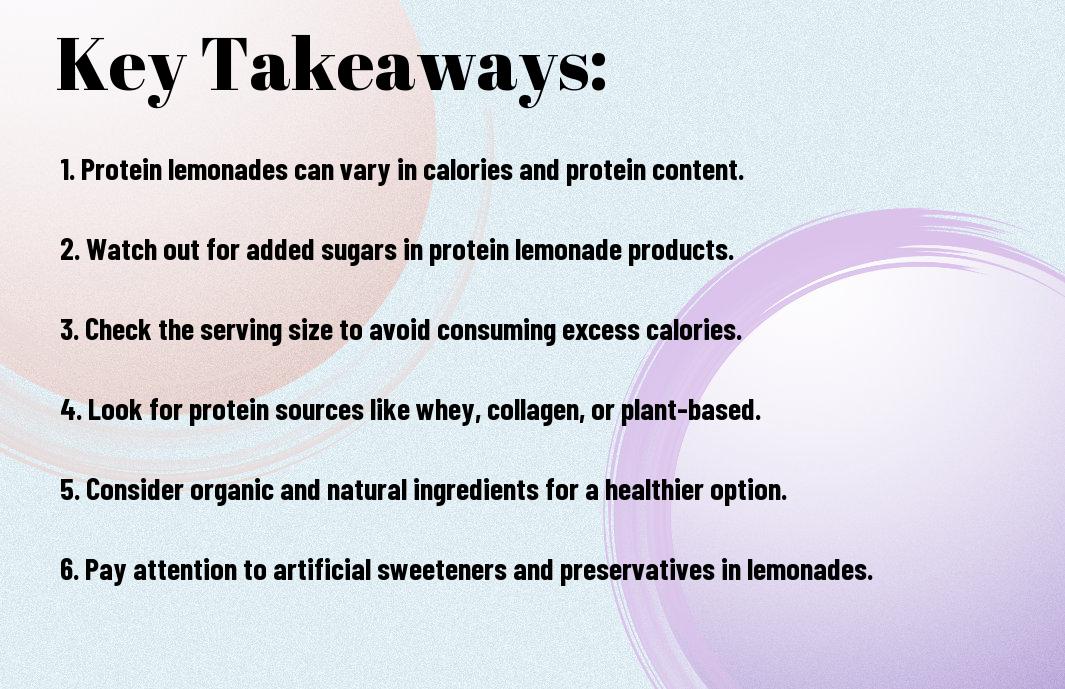Labels on protein lemonade products can be confusing, but understanding them is crucial for making informed decisions about your health. Protein lemonades are popular for their refreshing taste and nutritional benefits, but it’s imperative to pay attention to the calories, sugar content, and protein levels to ensure you’re choosing the best option for your diet. In this blog post, we’ll break down common terms and ingredients on nutritional labels of protein lemonade products to help you make smarter choices next time you reach for a bottle.

Unpacking the Nutrition Label
What is a Nutrition Label?
On every protein lemonade product, you will find a nutrition label that provides valuable information about the product’s ingredients, serving size, and nutritional content. This label is important for understanding what you are consuming and making informed choices about your diet.
Key Components to Look Out For
The nutrition label contains key components that can help you make healthier choices. Pay special attention to the serving size, as all the information on the label is based on this amount. Look at the total calories per serving to manage your calorie intake. Check the amount of protein to ensure you are getting enough in your diet. Watch out for added sugars and artificial ingredients that can be hidden in the ingredients list.
Protein Content in Lemonades
Deciphering Protein Sources
If you’ve ever been curious about the protein content in your favorite protein lemonades, decoding the protein sources is key. Ingredients like whey protein, pea protein, or collagen peptides are common sources of protein in these beverages. Choosing the right protein source can help you meet your dietary needs and fitness goals.
Daily Protein Intake and Lemonade
To understand how protein lemonades can fit into your daily protein intake, it’s important to consider your overall dietary needs. Protein is important for muscle repair and growth, so consuming an adequate amount daily is important for overall health. Incorporating a protein lemonade into your diet can be a convenient way to reach your daily protein goals.
On a regular basis, make sure to check the nutritional labels on protein lemonade products to determine the protein content per serving. Pay attention to the serving size and the amount of protein per serving to make sure it aligns with your daily protein intake goals.
Beyond Protein: Other Nutritional Facts
Once again, as we dive deeper into understanding the nutritional labels on protein lemonade products, it’s crucial to consider more than just the protein content. For a comprehensive guide on deciphering food labels, check out Decoding Food Labels: A quick and easy guide for parents.
Sugar and Sweeteners
The amount of sugar and type of sweeteners used in protein lemonade products can greatly impact their nutritional value. Keep an eye out for hidden sugars like high fructose corn syrup or artificial sweeteners like aspartame. Opt for products with natural sweeteners like stevia or monk fruit for a healthier option.
Additives and Preservatives
On the topic of additives and preservatives, it’s important to be aware of what goes into your protein lemonade. Some additives and preservatives can have negative health implications in the long run. Look for products that are free from artificial colors, flavors, and preservatives to make a more informed choice for your health.
Sweeteners: When choosing protein lemonade products, be cautious of excessive use of artificial sweeteners that can be harmful to your health. Opt for products that use natural sweeteners like stevia or monk fruit for a more wholesome option.
Smart Shopping for Protein Lemonades
Comparing Brands and Labels
Smart shopping for protein lemonades involves comparing brands and labels to make the best choice for your health goals. Here is a breakdown to help you navigate the nutritional information:
| Brands | Labels |
| Brand A | High in protein, low in added sugars |
| Brand B | Organic ingredients, no artificial sweeteners |
| Brand C | Low-calorie option, contains electrolytes |
Making Health-Conscious Choices
Comparing different protein lemonade brands and labels can help you make health-conscious choices. Look for low sugar content, natural ingredients, and high protein to ensure you’re getting a nutritious beverage. Choose brands that prioritize quality ingredients and minimal additives for a healthier option.
Summing up
Now that we have decoded the nutritional labels on protein lemonade products, we have a better understanding of what to look for when making choices for our health and wellness. By paying attention to key details such as protein content, sugar levels, and ingredient quality, we can make informed decisions that align with our dietary goals. Remember to always read the label carefully and prioritize nutrient-dense options to support your overall well-being. Cheers to making healthier choices and enjoying delicious protein lemonade guilt-free!
FAQ
Q: How do I decode the nutritional labels on protein lemonade products?
A: Decoding nutritional labels on protein lemonade products can be easy. Look for the serving size, total calories, protein content, sugar content, and any added vitamins or minerals listed on the label.
Q: What is the importance of paying attention to protein content in protein lemonade products?
A: Protein is important for building and repairing tissues in the body. Make sure the protein lemonade product you choose has an adequate amount of protein to meet your dietary needs.
Q: How can I determine if a protein lemonade product is a healthy choice?
A: Check the ingredient list for natural ingredients, avoid products high in added sugars or artificial ingredients, and look for products with a good balance of protein, carbohydrates, and fats.
Q: Are all protein lemonade products suitable for vegetarians or vegans?
A: Not all protein lemonade products are suitable for vegetarians or vegans. Be sure to check the label for ingredients like whey protein, gelatin, or any other animal-derived ingredients.
Q: Can protein lemonade products replace a meal in my diet?
A: Protein lemonade products may not be suitable as a meal replacement due to their low calorie and nutrient content. They are best consumed as a snack or supplement to your regular meals.

